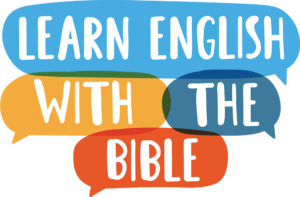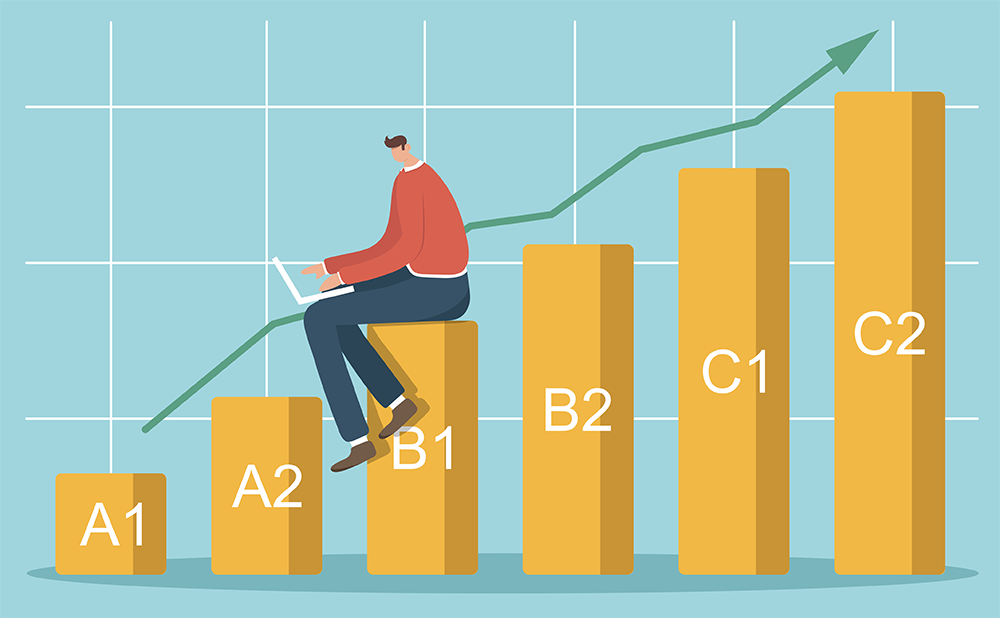Lots of adults who are learning English ask, “What is my English level? How much have I learned? What should I study next?” Here at Learn English with the Bible, we have self-study lessons in 3 categories: Advanced Beginner, Intermediate, and Advanced. How do you know which level is right for you?
In this post, we’ll talk about the CEFR levels of English, and the general knowledge required for each one. We’ll also talk about about online testing, both free and paid. Finally, we’ll talk about how the CEV Bible is great for any level.
The Common European Framework of Languages (CEFR, also CEF or CEFRL)
The CEFR was introduced in 2001, when the European Union Council recommended it to validate the language ability of speakers of European languages. Now, it divides learners of any language into six levels.
Here is a very brief summary of what a language learner should be able to do at each of these six levels.
6 CEFR Levels
- A1
Can understand and use familiar everyday expressions, introduce themselves and others, and interact in a simple way with help - A2
Can understand sentences and frequently used expressions related to everyday activities. Can describe their background and matters of immediate need. - B1
Can understand the main points of clear input on familiar, everyday matters and deal with most situations related to travel. Can produce simple connected texts and describe experiences and events with reasons and explanations. - B2
Can understand the main ideas of complex texts, including technical discussions. Can interact with native speakers without strain for either party, and produce clear detailed text on many subjects and explain opinions and viewpoints. - C1
Can understand a wide range of demanding, longer clauses and recognize implied meanings. Can express ideas fluently, use language flexibly, and produce clear, well-structured text. - C2
Can easily understand almost anything heard or read. Can summarize information and express themselves spontaneously. Can differentiate finer shades of meaning in complex situations.
CEFR's Self-Assessment Grid
CEFR has a “self-assessment grid,” where you can assess your own level by comparing your skills to the CEFR guidelines. Learn more about the CEFR at the Council of Europe (COE) website.
You can also take a free online test to determine your CEFR level. Let’s talk about some of these free tests.
Free Online Tests to Check Your English Level
It’s a great idea to check your English level with a free online test. This will help you discover where there may be gaps in your knowledge. It will also give you confidence about what you already know!
There are many places to take a free online test. Some websites ask for no information from you, and some ask you to register and log in to the website. Many will offer you paid courses when you finish the test. Here are some suggestions:
Test Your Level For Free at These Websites
- EFSET
efset.org/quick-check/
20 questions, 15 minutes. No sign-up required to start the test. - International House
ihworld.com/learn/ih-english-language-level-test/
60 questions, no time limit. No sign-up required to start the test - Cambridge
cambridgeenglish.org/test-your-english/
25 questions, no time limit - British Council
learnenglish.britishcouncil.org/english-levels/online-english-level-test
30 questions, 30 minutes. Register and create an online account before you take the test, and be ready to use UK English expressions.
There are many others. Some are connected to universities, like Cambridge, and some are connected to smaller independent schools. You can use these tests to help you find your approximate CEFR level just for your information, or to register for a paid online test.
Paid Online Tests
To confirm your certification in a language, you will probably need to take a paid exam that will be scored by language experts.
However, before you pay for an English certification exam, you should know how you want to use your English.
- Do you want to study in an English-speaking country?
- Do you want to live and work in an English-speaking country?
- Maybe you want to stay where you are, and be able to communicate with friends, family, and co-workers in English.
Choose an exam based on what that exam will provide for you. Here is a list of the most common English certification exams:
Most Common English Certification Exams
- TOEFL – Test of English as a Foreign Language
Used primarily for admission to a university. Focuses on how English is used in an academic setting. - TOEIC – Test of English for International Communication
Tests everyday and business language to gain a job or work visa. - IELTS – International English Language Testing System
Multi-purpose English test used by employers, governments, and educational institutions. Offers three types of test: Academic, General Training, and Life Skills (A1, A2, and B1) - OET – Occupational English Test
For medical professionals, accepted by many hospitals and institutions worldwide - PTE – Pearson Test of English
PTE Academic is for study abroad, and PTE General will give general learners a certification in the CEFR level achieved.
Cambridge also offers testing at different levels: Key, First, Preliminary, Advanced, and Proficiency. There are other English tests, so be sure to check and see which test is recommended by the school or employer you choose.
What Self-Study Level Should I Choose at Learn English with the Bible?
Here at Learn English with the Bible, our self-study categories are Advanced Beginner, Intermediate, and Advanced. As you can see, we only have three levels, while the international CEFR standard has 6 levels.
Question: So which self-study lessons should you choose?
Simple answer: Try one and see!
Self-Study Reading and Listening
Reading: the length of the reading text for an advanced lesson is longer than a beginner text.
Listening: Listening lessons for beginners and even intermediates are done in slower English. Advanced lessons are read for you at normal speaking speed.
Self-Study Grammar
Grammar topics are based on levels. We teach the recommended grammar topics for each level. For example, a beginner lesson might talk about the past tense, while an advanced lesson could focus more on creating more complex sentences with clauses and using the conditional mood.
Why I Use the CEV Bible
The CEV Bible uses everyday words and phrases from modern English to accurately tell the stories in the Bible. I’ve chosen to use the CEV Bible because the translators of this version studied speech patterns from modern books, magazines, newspapers and television. This helps people with little or no knowledge of “Bible” language understand it easily when they read it or listen to it. The translators also wanted to make sure that everyone could understand it, regardless of their religious or educational background.
Practice English Every Day
So regardless of your level of English, give each lesson a try! Learn what you can from it, then perhaps try it again at a later date. Advanced learners can refresh their memories on easier topics with a beginner lesson, as well as get some more reading and listening practice.
As long as you read and listen to English a little bit each day, you will improve! Speak, speak, speak – and don’t worry too much about grammar. It will come with time! Try an online test if you like, but don’t stress too much. Enjoy learning English and learning from God’s Word here at Learn English with the Bible.
Thanks for reading! I hope this article about English levels helped you. Leave a comment below and I’ll see you soon!



